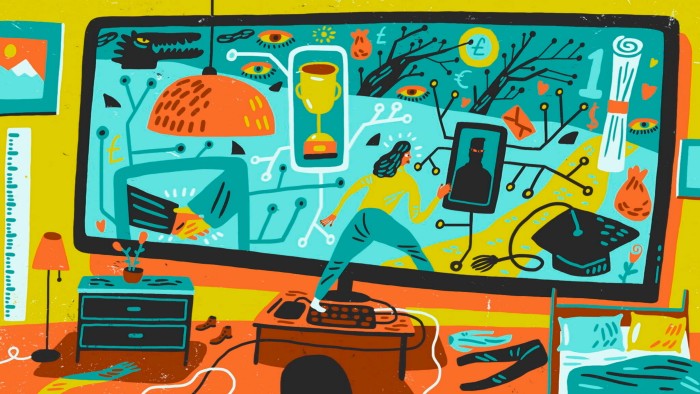Unlock the Editor’s Digest for free
Roula Khalaf, Editor of the FT, selects her favourite stories in this weekly newsletter.
Sal Khan tightly controls his children’s screen time and their access to social media, but the founder and chief executive of the Khan Academy, an online education organisation, is a big believer in the power of the digital world and artificial intelligence to help students get ahead.
“Apps and games are clearly designed to be addictive, but technology in moderation is fundamentally neutral,” he says. “Many adults get angry with their kids but are also addicted to their phones. We should all say no to using devices at all times.”
Like many executives in Silicon Valley, he is well aware of the dangers of technology and how far apps have been designed to drive usage and harvest personal information. But he also sees the value of new tools to support more personalised and effective learning, ironing out differences in access to resources and boosting education more broadly.
Outside the classroom, too, the digital world offers clear benefits in life and leisure, as well as dangers.
In this FT report, part of our free access programme for secondary and high schools globally, we outline practical advice for students: highlighting trends, tools and guidelines to help navigate the digital world more effectively.
Navigating the Digital World
Our reporters explore side hustles such as reselling second-hand clothes, which can generate extra cash and help improve sustainability by at least partly offsetting the waste of “disposable” fashion. They also offer advice on detecting scams.
We showcase a range of useful apps for young people which can help with learning, relaxation, time management, travel and safety. And we explore the potential of tools such as LinkedIn, combined with online search enhanced by AI, to identify and apply for jobs, even as technology is shaking up the employment market.
We also tap the expert advice of Childnet, a charity that aims to make the internet a safer place for young people, on practical ways to deal with the growth in online bullying, hate and sextortion: help is available to push back.
The dark side of technology spans what might be called the “four Ds” or downsides of the digital world: financial deceit, personal distraction, disinformation and the potential for a drop in thinking ability.
“There’s an ongoing pressure that young adults face, which is magnified in their digital spaces: what to do post high school, their purpose in life, comparing to each other online,” says Jamie Nuñez, a senior manager at Common Sense, a non-profit organisation that works to improve the digital world. “That leads to a level of anxiety and stress, and a reliance on technology that encourages poor life choices.”
Alongside the possibility of scams that cause financial loss, the explosion in online activities brings wider risks, such as tempting young users to “feed the beast” of social media by generating their own content for free and distracting attention from other activities.
The psychological tricks deployed by social media platforms, and the underlying commercial motivations of the companies and influencers using them, have been well documented by former tech company insiders. Tristan Harris, a former Google executive who co-founded the non-profit Center for Humane Technology, warns there has been a surge in disinformation, with every incentive for the loudest voices to share divisive views, however inaccurate.
That has led to growing calls for tougher policing of social media platforms, and restrictions on the use of personal devices in schools. Nearly half of young people in one recent UK poll argued they would rather live in a world without the internet, and more than a quarter said they would prefer it if social media did not exist.
But online engagement can be empowering, help bridge divides and foster human connections. Organisations such as UPchieve connect students with qualified tutors around the world to help with their studies. Khan’s own recent civic dialogues programme aims to bring students with different perspectives together to improve mutual understanding.
There is a need to be vigilant about the risks of a decline in critical thinking as we outsource work to AI, just as Google has displaced much memorisation of facts.
But Khan, who recently wrote the book Brave New Words about AI and education, suggests technology still works best when supplementing human effort. “It’s still very important to learn basic skills,” he says, adding that the people who have the highest understanding “are getting the most out of it.”




